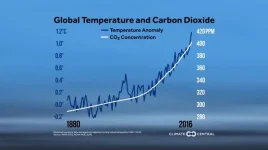The problem is past records don't apply today.
Wait, what? A day or so ago, you were complaining that breaking records doesn't matter, because we supposedly didn't have enough information about the past. Now you're saying that past records don't apply? Which is it?
Anyway....
Continental drift happens on the scales of hundreds of millions of years; if that has any effect on proxy temperatures, that's almost certainly accounted for in the calculations.
The moon's orbit changes by 3.8cm per year; after 1 million years, that's a
0.01% change. Aside from the fact that probably doesn't have a noticeable impact on tides, tides do not change GHG ppm or global temperatures by any significant account.
Climate scientists have modeled ocean currents for decades.
In order for past climate changes to be relevant today we need the same variables today as we had in the past.
Actually, we don't.
First of all, climate scientists already look at the past to develop and/or confirm ideas about the likely effects of changes in the climate, the effects of natural cycles, the impacts of greenhouse gases, and more. The "variables" do not need to be exactly the same in order for knowledge of earlier periods to be beneficial to our understanding of climate change.
Second, climate scientists have spent decades developing climate change models, including using techniques like hindcasting (using conditions from earlier periods in time, running them through the models, and comparing the projections to actual results). Needless to say, they can adjust variables as required, and often run a variety of scenarios, as the biggest variable right now is probably "how much GHGs will humans dump into the atmosphere over the next 10, 20, 50 years."
Third, these ambiguous "variables" don't all need to be the same between past and present for us to understand and observe the causes of climate change. For example, lab and field experiments confirm that CO2 is a greenhouse gas, and help us estimate the impact of doubling CO2, as well as the feedback effects that is likely to cause. Analysis of the past is certainly beneficial, but it's definitely not the only tool at our disposal.
Then you have all the wild cards that have been thrown into the game such as super volcanoes, asteroid strikes, comet strikes, you have the earths wobble etc.. Change all the variables around and what happened in the past is not what is going to happen today.
You are correct that since 1750, the climate has not been changed significantly by volcanoes, asteroid strikes, or major solar changes. You are incorrect if you imagine we have no clue whatsoever what those types of events do to the climate. There is a lot of uncertainty, to be sure -- even something like the height of a volcanic plume can change its impact. However, we can say with a good degree of certainty that global temperatures are
soaring at rates that are significantly higher than in the past, possibly by an entire order of magnitude.
We also know that what is happening in the present didn't happen in the past, because in the past humans weren't dumping 9
gigatons of CO2 per year into the atmosphere (among other greenhouse gases).
Sorry, but vague invocations about "variables" do not disprove everything we know about climate change.






